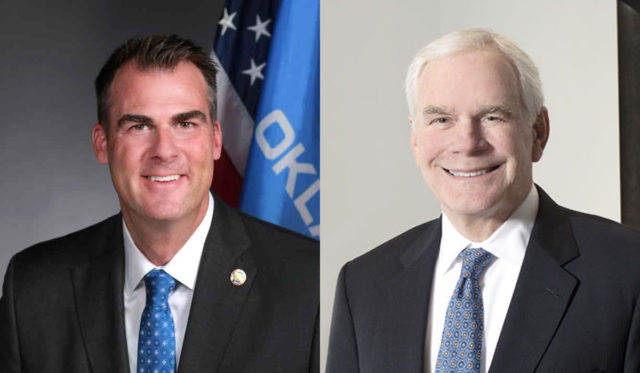

Three years after an American Bar Association committee deemed him “not qualified” for a federal judicial nomination, Tulsa lawyer John O’Connor has been selected by Gov. Kevin Stitt to be Oklahoma’s next attorney general, according to multiple sources and a report in The Oklahoman.
A spokesperson for Stitt’s office declined to comment following The Oklahoman’s story, but sources say the governor is expected to announce his selection Friday at a Tulsa press conference, 58 days after former Attorney General Mike Hunter announced his resignation May 26.
O’Connor has been with the law firm Hall Estill since a 2018 merger with his prior firm. He previously was a partner in Newton, O’Connor, Turner & Ketchum, where he worked from 1983 until the merger. From 1979 through 1983, he was employed by the law firm Rosenstein, Fist & Ringold.
During his legal career, O’Connor’s primary practice areas have been corporate law, insurance and torts, general litigation, and mergers and acquisitions, according to his Hall Estill biography.
O’Connor’s public service includes being a trustee of OSU-Tulsa, a member of the Tulsa Ethics Advisory Committee and chairman of the local Rotary International Foundation. He is also listed as a board member for the Tulsa nonprofit Food on the Move, and his U.S. Senate questionnaire for judicial nominees lists a variety of other civic endeavors.
Born in 1954, O’Connor graduated from Oklahoma State University in 1977 and then from the University of Tulsa College of Law. Records indicate O’Connor has been particularly interested in the laws governing adoptions, having testified in an Oklahoma legislative committee in the 1990s on the topic.
John O’Connor: Almost a federal judge
In April 2018, then-President Donald Trump nominated John O’Connor to be a roving judge across Oklahoma’s three federal court districts: the Western District, Northern District and the Eastern District.
But his Senate confirmation was derailed by a reportedly unanimous decision by the ABA committee to deem O’Connor as unqualified for the federal bench. A committee member said O’Connor was analyzed in the areas of intellectual capacity, knowledge of the law, character and reputation.
“The confidential peer review revealed several instances of ethical concerns, including candor with the court, evidence of overbilling of clients and billing practices criticized by courts, an improper ex parte communication with a court, and improper contact with adverse parties in litigation,” wrote Paul Moxley, the ABA rating committee chairman.
In that letter, Moxley did not cite specific examples of the issues considered by his committee, but he wrote a second letter outlining concerns about his employment at the Oklahoma Insurance Department and a pair of bar complaints filed against him in 1994 and 2012.
The ABA designation helped prevent O’Connor’s nomination from being considered. He ultimately withdrew his name for consideration in early 2019.
“It was a great honor to have been nominated by the president for the federal judgeship,” O’Connor said in a statement at the time. “To serve the citizens of Oklahoma in the court has been a life-long dream.”
Throughout the saga, O’Connor received strong support from Tulsa Mayor G.T. Bynum, U.S. Sen. James Lankford (R-OK) and U.S. Sen. Jim Inhofe (R-OK).
“We are missing out on an opportunity to place a person of the highest integrity and competence on the federal bench to serve all Oklahomans,” Inhofe said in January 2019.
But O’Connor was not the only Trump nominee to the federal bench in Oklahoma who the ABA deemed unqualified. The same ABA committee recommended against approving the nomination of Charles Goodwin, whom Trump nominated for a Western District judicial vacancy.
The ABA questioned Goodwin’s work ethic, but the U.S. Senate ultimately voted to confirm him in August 2018.
Most recently, O’Connor represented the State Board of Education after it was sued by Oklahoma City, Tulsa and about 200 other public school districts regarding a controversial state board action.
Full plate for incoming attorney general
O’Connor’s selection comes after weeks of speculation about whom Stitt would choose to replace Hunter, who said his resignation stemmed from an extra-marital affair.
Before his departure, Hunter was involved in several high-level legal matters, including appeals stemming form the U.S. Supreme Court decision in McGirt v. Oklahoma. Hunter had also led the state’s lawsuits against opioid manufacturers, and an appeal on the verdict in the case against Johnson & Johnson remains pending.
Numerous criminal investigations involving public entities and public officials also are ongoing, and O’Connor may ultimately have to make decisions on matters of potential public corruption, although some of the cases are under investigation by federal law enforcement agencies.
But Hunter’s unexpected resignation — as criminal and civil law questions flood the eastern part of Oklahoma owing to the McGirt case that his team lost — provided Stitt an opportunity to appoint a new attorney general, one likely to be more aligned with Stitt’s hard-line stances in state-tribal negotiations.
While government-to-government relations are always nuanced, Hunter was primarily seen as friendly to the larger Native American tribes whose reservations have recently been reaffirmed by federal and state courts. Stitt has aligned himself more closely with smaller tribes that have clashed with their bigger counterparts over casino locations, the slot machine industry and land-in-trust issues.
O’Connor was a member of the Cherokee Nation Bar Association from 1996 to 2008, according to his U.S. Senate questionnaire.
Gentner Drummond, a Tulsa and Osage County attorney who narrowly lost the 2018 Republican primary to Hunter, has already announced his 2022 campaign for attorney general.
John O’Connor U.S. Senate questionnaire
(Correction: This article was updated at 8:25 a.m. Friday, July 23, to correct reference to O’Connor’s client in lawsuits related to a State Board of Education action.)




















